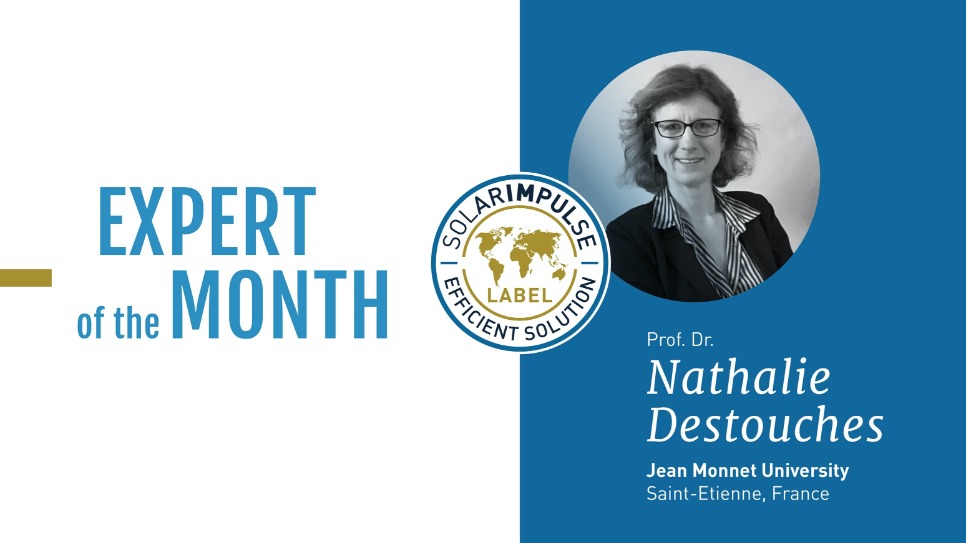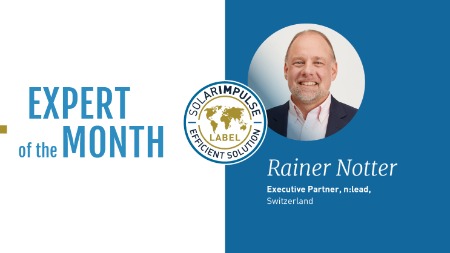Interviews - December 3, 2020
November's Expert of the Month: Professor Nathalie Destouches!


Written by Jamie Wylie 3 min read
Each month, one person from our Expert Community will be showcased in an article highlighting their background and experiences during their time with the Solar Impulse Foundation. The Expert of the Month award places a spotlight on an Expert who has gone above and beyond in their role to help label sustainable and profitable Solutions.
November's Expert of the Month: Professor Nathalie Destouches!
The Expert of the Month award for November goes to Professor Nathalie Destouches! Nathalie joined the Expert Community in July this year, making her one of our newer Experts. She is a Professor of Physics at Université Jean Monnet in Saint-Étienne. Her expertise lie in photonics and nanotechnologies. A big thank you to Nathalie for all her work since joining as an Expert!
Please tell us about your area of expertise and profession?
After an engineering degree and a PhD in photonics, I had an academic career at university. I have been professor for about ten years during which I explored complex behaviours of light when interacting with matter at different spatial and temporal scales. Light is a continuous source of energy for the Earth, which was wonderfully put to the forth by the project Solar Impulse. Light also became much more with the development of science and technology. It is indeed a link between people with high-speed communications or light emitting devices, a utensil to heal with laser surgery for instance, a tool for improving technological performances with micro-machining or surface functionalisation, a means to clean up the air through photocatalysis… The list of the fascinating applications of light is much longer. I feel lucky to be part of a community where innovation can still go with progress.
What current projects or topics are you involved in with your research? Any interesting partnerships or collaborations?
After years of upstream research, I had the opportunity to develop applied research in collaboration with an international company in the field of security while continuing addressing fundamental questions. With my team and our international collaborators, we work to develop new models, explain unexplored mechanisms, discover new materials and material properties and inspire industrial innovation. In our current research, we play with laser-induced self-organization in nanomaterials to better control light absorption.
What is the most promising or exciting area of your research focus which could help the transition to clean energy and sustainability?
This is a big question and I must be very humble. Our main work is rather fundamental and we do not develop direct applications ourselves. However, our results may contribute to make some technologies more efficient or sustainable on the mid-term. Laser-induced self-organisation can mimic the morphology of biological surfaces and provide surface properties such as hydrophilicity or hydrophobia, anti-adhesive or anti-friction, which can improve the efficiency of some technologies. Colleagues have thought to apply laser-induced friction-reduction to decrease the CO2 emission of thermal engines for instance. On our side, we could imagine our sustainable nanomaterials on window panes of buildings for a better thermal efficiency and for air purification.
What is the most rewarding aspect of your work?
Research has the great advantage to provide moments of intense excitement when something becomes clear after being mysterious for months or years sometimes. Collaborative work is always the most exciting, especially when working with people from different backgrounds. It is always when we learn from each other that the best ideas come up. I am also lucky to coordinate an Erasmus Mundus joint Master Degree entitled Photonics for Security Reliability and Safety involving three other European universities and many industrial partners. Our aim is to train highly-skilled engineers that will address the future societal challenges related to security and safety of people, goods and environment. Teaching and interacting with motivated students coming from all over the world is very stimulating.
What does being part of the Solar Impulse Foundation mean to you?
I joined the Solar Impulse Foundation first because I was impressed by the pioneering work driven by Bertrand Piccard within his foundation and I liked to think that innovation can be source of progress for humanity. Without being an industrial innovator myself, I am happy to modestly contribute to the project of finding 1000 profitable Solutions to the environment by giving a little bit of my time while using my skills. It is also for me an interesting opportunity to open my mind and to discover very good ideas I never heard about. It is a kind of win-win play.
What are your hopes for the labeled solutions, and the mission of the Solar Impulse Foundation more widely?
We know that the Earth, its environment, biodiversity and humanity, suffer due to the development of our civilisation over the past 200 years. Scientists give us data and facts, we cannot ignore what happens. However, it is often very difficult for everyone to act and change. Bertrand Piccard’s initiative has the great advantage to open a path and to fix an ambitious but reachable target that may have an impact. And it is a collective project, so it may spread the idea that not all is lost and that putting all the initiatives together may start a global change. Some people want to change the world on their own, it seems that the Solar Impulse Foundation believes that we can collectively change by rewarding good practices. So what are my hopes? Maybe that these 1000 labelled Solutions will be the impulse of a tidal wave that will change the mind of much more people around the world.
Are you interested in joining the Expert Community? Find out more about becoming an Expert here.

Written by Jamie Wylie on December 3, 2020


